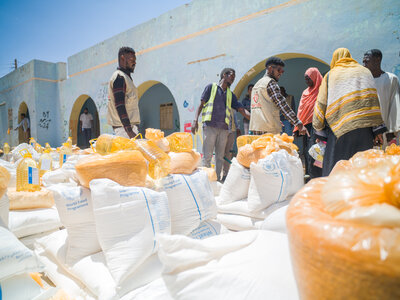Emergency
Sudan
- 21.2 million
- people facing acute hunger
- 4 million
- people supported by WFP each month
- US$700 million
- Urgently needed for WFP operations up to February 2026.
Sudan is the world’s largest hunger crisis. Famine conditions have been confirmed in Al Fasher and Kadugli, with the risk of famine in 20 additional areas across Greater Darfur and Greater Kordofan.
In the western regions of Sudan – notably North Darfur, South Darfur, West Kordofan and South Kordofan – conflict and severely restricted access is driving a sharp deterioration in hunger and malnutrition.
An estimated 21.2 million people – 41 percent of the population – are facing high levels of acute food insecurity, according to the latest Integrated Food Security Phase Classification.
Sudan is also the world’s biggest displacement crisis with more than 12 million people – one in three Sudanese – forced from their homes by the conflict.
The World Food Programme (WFP) is a critical lifeline for millions of people, with emergency food assistance helping to reverse famine conditions in nine locations where conflict had subsided and access improved.
However, the gap between humanitarian needs and existing resources is massive. From February 2026, hunger is expected to worsen as food stocks run out and fighting continues.
An end to hostilities and safe, unimpeded and sustained humanitarian access is needed to prevent further loss of life and protect livelihoods.
WFP urgently requires US$700 million to continue its operations in Sudan from January to June 2026.
What the World Food Programme is doing to respond to the Sudan emergency
-
Emergency response
-
Funding shortfalls have forced WFP to prioritize the most hungry communities. We are reaching over 4 million people a month, including 1.5 million in the hardest-hit and previously hard to reach areas across Darfur, Kordofan, Khartoum and Al Jazira. We are reaching around 80 percent of people in the 27 famine and risk-of-famine areas. WFP has also expanded assistance in areas where conflict has subsided, such as Khartoum State, Al Jazira, and Sennar, where over 800,000 people are supported every month.
-
Resilience
-
UNHAS
-
Logistics
-
Emergency Telecommunications Cluster

